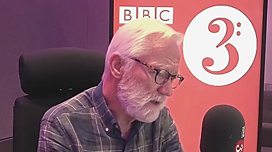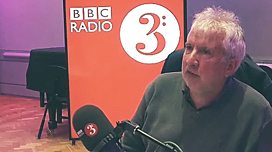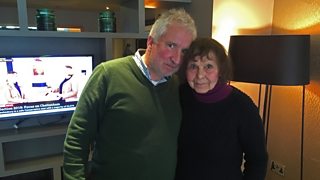
A Brave New World
Sofia Gubaidulina's process of self-discovery as a young composer led her to experiment with a diverse range of sounds and instruments. With Donald Macleod and Gerard McBurney.
Sofia Gubaidulina's process of self-discovery as a young composer led her to experiment with a diverse range of sounds and instruments. With Donald Macleod and Gerard McBurney.
To mark Sofia Gubaidulinaβs ninetieth birthday, Donald Macleod and Gerard McBurney explore five different aspects of her progressive and distinctive music. Gubaidulina has been living in Germany since 1992 and is still busy composing today. When she was born in 1931 in Tatarstan, the Soviet Union was under Stalinist rule. Up until her emigration, she worked as a composer under the strictly regulated conditions determined by Soviet cultural policies. Across the week we get an insight into the life of a composer behind the Iron Curtain, as Gubaidulina developed her own creative path, unswayed by any hint of ideological pressure.
After completing postgraduate studies, Gubaidulina was free to consider what her own voice might be. At the same time she was learning what the Soviet authorities might expect of her.
Seven words for Cello, Bayan and Strings in seven movements
Est ist Vollbracht
Maria Kliegel, cello
Elsbeth Moser, Bayan
Kathrin Rabus, violin
Camerata Transsylvanica
Gyorgy Selmeczi, conductor
5 Etudes for harp, double bass and percussion
no 1: Largo
no 4: Allegro disperato
no 5: Andante
Elsie Bedleem, harp
Martin Heinze, double bass
Jan Schlichte percussion
Vivente β non vivente
Sofia Gubaidulina, synthesiser
Artyomov: Archipelagos of Sounds in the Ocean of Time (excerpt)
Astraea
Vyacheslav Artyomov
Sofia Gubaidulina,
Viktor Suslin,
playing various unidentified percussion
Sheptalki
Valentina Ponomareva, vocal
Concordanza for instrumental ensemble
Sinfonia Lahti Chamber Ensemble
Osmo VΓ€nska, director
Last on
![]()
Blacklisted!
Donald Macleod and Gerard McBurney discuss the effects on artists of Soviet oppression.
![]()
The soul's journey of In Croce
Donald Macleod and Gerard McBurney discuss the symbolism in Gubaidulina's In Croce.
Music Played
-
![]()
Sofia Gubaidulina
The Seven Last Words of Christ for cello, bayan and strings (Est ist Vollbracht)
Performer: Maria Kliegel. Performer: Elsbeth Moser. Orchestra: Camerata Transsylvanica. Conductor: GyΓΆrgy Selmeczi.- NAXOS : 8.-553557.
- NAXOS.
- 12.
-
![]()
Sofia Gubaidulina
5 Etudes for harp, double bass and percussion (Nos 1, 4 & 5)
Performer: Elsie Bedleem. Performer: Martin Heinze. Performer: Jan Schlichter.- NEOS : 11106.
- NEOS.
- 1.
-
![]()
Sofia Gubaidulina
Vivente - non vivente
Performer: Sofia Gubaidulina.- MELODIYA : SUCD-10-00109.
- MELODIYA.
- 9.
-
![]()
ΠΡΡΠ΅ΡΠ»Π°Π² ΠΠ΅ΡΡΠΎΠ²ΠΈΡ ΠΡΡΡΠΌΠΎΠ²
Archipelagos of Sounds in the Ocean of Time (excerpt)
Ensemble: γ’γΉγγ¬γ’.- METIER.
-
![]()
Sofia Gubaidulina
Sheptalki
Performer: Valentina Ponomareva. Ensemble: Mark Pekarsky Percussion Ensemble.- VAPIROV.
-
![]()
Sofia Gubaidulina
Concordanza for instrumental ensemble
Ensemble: Lahti Sinfonia Chamber Ensemble. Conductor: Osmo VΓ€nskΓ€.- BIS : CD 636.
- BIS.
- 4.
Broadcast
- Tue 2 Nov 2021 12:00ΒιΆΉΤΌΕΔ Radio 3
Sofia Gubaidulina in words and pictures
Beethoven Unleashed β the box set
What was really wrong with Beethoven?
Composers A to Z
Who knew? Five eye-opening stories from Composer of the Week
Five reasons why we love Parry's Jerusalem
What is the strange power of Jerusalem which makes strong men weep?
A man out of time β why Parry's music and ideas were at odds with his image...
The composer of Jerusalem was very far from the conservative figure his image suggests.
Composer Help Page
Find resources and contacts for composers from within the classical music industry.








